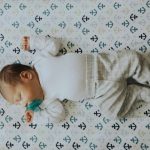Summary: New research from the University of Virginia (UVA) School of Medicine has found that over a quarter of new mothers reported falling asleep while feeding their babies, often in potentially unsafe locations such as chairs or sofas. This unplanned sleep significantly increases the risk of sudden infant death syndrome (SIDS), with the confined spaces of these locations raising the risk by up to 67 times compared to a bed. The researchers emphasize the need for better education on safe nighttime feeding practices, acknowledging that while mothers try to stay awake, the natural sleep-inducing effects of breastfeeding can make this difficult. They advocate for a proactive approach to help parents plan for safer feeding environments.
Key Takeaways:
- Unintentional Sleep Poses a Serious Risk: More than 80% of mothers who fell asleep while feeding did not plan to do so, with many choosing chairs or sofas—locations that are up to 67 times riskier for infants compared to beds.
- Safer Alternatives for Tired Parents: The American Academy of Pediatrics advises that, if mothers might fall asleep while feeding, it is safer to do so in an adult bed rather than on chairs or sofas to reduce the risk of suffocation.
- Call for Better Parental Guidance: The study highlights the need for healthcare providers to educate parents on the sleep-inducing effects of breastfeeding and to develop practical nighttime feeding plans to enhance infant safety.
More than a quarter of new mothers have fallen asleep recently while feeding their babies, putting the infants at increased risk of sudden infant death syndrome (SIDS), research from the University of Virginia (UVA) School of Medicine reveals.
More than 80% had not intended to fall asleep, and many had chosen to feed in chairs or on sofas rather than in a bed. Unfortunately, the cushions and confines of those locations can be very unsafe for babies, raising the risk of death by 49 to 67 times.
The researchers, with UVA Health and UVA Health Children’s, are urging care providers to provide additional guidance for new parents on safe feeding practices, such as informing new moms that a hormone naturally released during breastfeeding will make them feel sleepy.
“While falling asleep while feeding young infants is not in itself too surprising, what is very alarming is that the majority of mothers did not plan to fall asleep, so the sleep space was potentially unsafe for the baby while both slept,” says researcher Fern Hauck, MD, MS, a safe-sleep expert at UVA Health and the UVA School of Medicine, in a release. “This highlights the need for parents to be educated about the potential risk of falling asleep while feeding and to plan for that possibility by making the space around the baby as safe as possible. That would include removing pillows and blankets to ensure an open airway for the baby.”
Safe Infant Feeding
Hauck and her collaborators, including UVA’s Ann Kellams, MD, and Rachel Moon, MD, analyzed survey results collected from more than 1,250 new mothers as part of the Social Media and Risk-reduction Training study conducted at 16 US hospitals in 2015 and 2016. Most respondents completed the survey when their infant was between 2 and 3 months of age.
Among the respondents, more than 28% said they had “usually” or “sometimes” fallen asleep during feeding in the prior two weeks. Of those, a whopping 83.4% said falling asleep was unplanned.
Women who fed in bed were more likely to fall asleep (33.6%) than those who fed on a chair or couch (16.8%). The American Academy of Pediatrics (AAP) recommends mothers at risk of falling asleep while breastfeeding should do so in an adult bed rather than a chair or couch.
Many of the women who fell asleep on chairs or sofas said they chose those locations specifically to avoid falling asleep, to avoid locations (such as a bed) they had been told were unsafe or to avoid disturbing someone else. (The AAP warns moms against sharing a bed or other sleep space with an infant because of the risk the parent might accidentally roll over and smother the child, or that the child could become tangled in bedding. But the group also says that beds are safer than chairs and sofas if falling asleep while feeding is a possibility.)
“We need to meet families where they are and come up with a nighttime plan for sleeping and feeding their baby that works for them and is as safe as possible,” says Kellams, a pediatrician and breastfeeding and lactation medicine specialist at UVA Health Children’s, in a release. “Our data suggest that too many of these falling asleep incidents are not planned, so discussions about how to plan for feeding your baby when you are very tired are important.”
The researchers note that providing parents with information about safe sleep and feeding has been shown to reduce risk of unexpected death significantly. But this educational outreach needs to be expanded, they say. Care providers should acknowledge that moms face a very real risk of falling asleep while feeding, even if they are trying not to, and provide practical advice on how to reduce that risk. Further, the researchers are urging additional studies to find ways to assist parents in both safe-sleep practices and breastfeeding.
“We hope that parents of young infants will think proactively about what might happen in the middle of the night,” says Moon, a pediatrician and safe-sleep expert at UVA Health Children’s, in a release. “Feeding your baby in your bed is safer than feeding on a couch or armchair if you might fall asleep.”
ID 78223907 © Antoniodiaz | Dreamstime.com




Leave a Reply